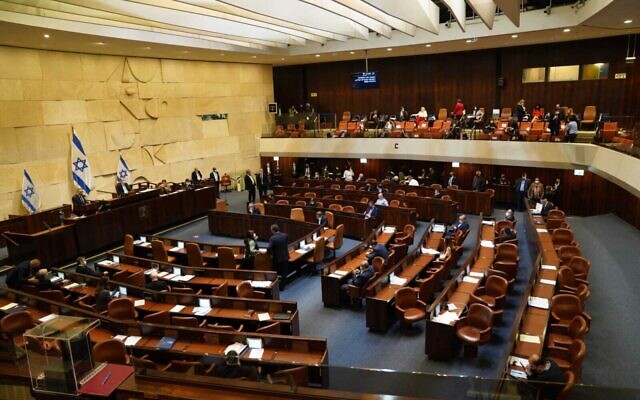Avichai Mandelblit says petitioners seeking to repeal legislation have no legal basis to do so, says law ‘does not detract from the individual rights’ of any citizen
By TOI STAFF .3 December 2020, 11:02 pm

Attorney General Avichai Mandelblit speaks at the 17th annual Jerusalem Conference of the ‘Besheva’ group, on February 24, 2020. (Olivier Fitoussi/ Flash90)
Attorney General Avichai Mandelblit announced Thursday that he was opposed to High Court of Justice intervention in the controversial Jewish nation-state law, ahead of the court’s expected review of the law in three weeks’ time.
In response to multiple petitions to the court seeking to repeal it, Mandelblit wrote that petitioners do not have a suitable legal basis that would justify the court’s annulment of the 2018 law, which was legislated into Israel’s quasi-constitutional Basic Laws. Mandelblit recommended that the petitions be rejected.
In support of the law, Mendelblit wrote it gives “constitutional attire” to the country’s Jewish national identity, and does not “detract from the individual rights of every person in the State of Israel, regardless of religion or nationality.”
The law — which for the first time enshrined Israel’s status as “the national home of the Jewish people” and says “the right to exercise national self-determination in the State of Israel is unique to the Jewish people” — sparked widespread criticism from Israel’s minorities and opposition, as well as the international community and Jewish groups abroad.
Critics have argued that the legislation contravenes the basis of Israel’s legal system, as well as its Declaration of Independence, by solidifying inequality amongst its citizens.
It prompted particular outrage from Israel’s Druze minority, whose members, many of whom serve in the military, say its provisions render them second-class citizens.
At the time, 50,000 people attended a Druze-led rally in Tel Aviv protesting the law, including former top military and security officials. A similar, Arab-led rally against the law in Tel Aviv drew 30,000 protesters.

People take part in a protest march against the proposed Nation-state Law in Tel Aviv on July 14, 2018. (Tomer Neuberg/Flash90)
<
>
A group of Druze Israelis also filed a petition to the High Court of Justice seeking to have the law overturned, arguing it “creates race-based discrimination, excluding 20 percent of the nation’s citizenry and creating castes among Israeli citizens.” Along with the Druze petition, Arab and Bedouin leaders, rights groups, academics and opposition parties have also asked the court to strike down the law.
The Netanyahu government has maintained that the law merely affirms the country’s existing character, and that Israel’s democratic nature and provisions for equality are already anchored in existing legislation.
On Wednesday, Defense Minister Benny Gantz’s Blue and White party pulled a bill aimed at legislating a Basic Law making discrimination illegal, before it was to be voted upon, after failing to garner the necessary support for the measure from fellow lawmakers.
The principle of equality is not explicitly stated in Israel’s quasi-constitutional Basic Laws, but judges have interpreted “Basic Law: Human Dignity and Liberty” to include it.
The proposal was part of a batch of bills opposed by Prime Minister Benjamin Netanyahu’s Likud that Blue and White has raised as the short-lived coalition appears poised to collapse.
The measure had been scheduled to come up for a preliminary vote immediately ahead of a motion for the Knesset to disband, which passed in a preliminary reading with Blue and White’s support, moving Israel closer to its fourth election in under two years.

The Knesset plenum on December 2, 2020. (Knesset spokesperson/Danny Shem-Tov)<
>
The bill, named “Basic Law: Equality” is “aimed to enshrine the right to equality and the prohibition of discrimination,” according to Blue and White.
Blue and White said the bill will be brought for a vote next week instead.



well said, Adam.
Language should be added to the law, mentioning the minority communities by name, saying that they are honored citizens of Israel, and restating the Balfour Declarations’ language that their “civil and religious rights” are guaranteed. It should also say that the minority communities have complete autonomy in religious matters, subject only to considerations of national security.
I believe in being generous with words, but very tough in actions.